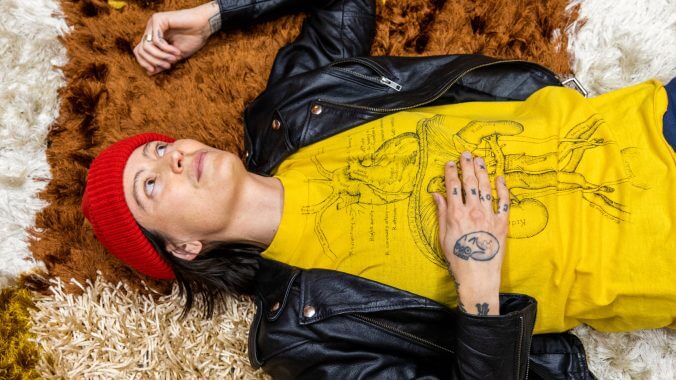Jenn Champion Looks Back
We sat down with the Seattle musician to talk about how she funded a record through Kickstarter, composed a deliberate arc of catharsis and found trust in her own intentionality.
Photo by Jimmy Bazan
“I think, in the context of a record, sometimes it’s such a safe place to be sad, you can really experience this almost pleasure in sadness,” Jenn Champion says over Zoom, “I don’t know what it is about sad music that I can find some pleasure in it, there’s just something so appealing to listen to it.”
Sad is an ethereal static idea that has clung to band names throughout Champion’s career, projects like Seattle indie rock band Carissa’s Wierd and the bedroom-pop leaning S. Sad and its associated charges; emotional, moody, dark, somber. Sad as the flat idea of a position opposite to joy. But what is sadness if not a spectrum of feelings and emotional states that shifts in our hearts as the years mark our hearts and bodies on this earth? Champion, an ardent practitioner of this relative theory of emotional states, is here with a new record, The Last Night Of Sadness, to shepherd us through a journey of what bounty sadness has to offer.
Funded entirely through a Kickstarter campaign, The Last Night Of Sadness builds on the foundation of synth-forward electronic pop music that Champion has been adding to over the course of a career that has shifted and found new forms with the passing years. From her debut album as Jenn Champion, Single Rider (released via Sub Pop sister label Hardly Art in 2018), she has proved herself adept at the sublime alchemy of sadness and ecstatic release, electronic music danceable for eager feet wrapped with tender words that bleed hearts dry. All of this is present still in The Last Night of Sadness, layered synths and haunting vocals crafting exquisite rhythms behind stories of loss and trauma and the well-earned victories found at the heart of survival.
It’s a creative vision with a deliberate arc, a cycle of somber reflection, loss and grief and acceptance that nonetheless finds time to hold delicate space for perseverance and what joy there is to be found in finding all the ways that life has yet to show you. The album as a journey through the stages of processing all things, feeling what feelings may haunt us. This too is deliberate; “The sequence is very intentional,” Champion says of the album as a complete vision, “the whole record being a journey where you get to know me a little bit and my experience in the world, the journey of do I want to live, and then my friends are dying and then this is precious, you know?”
Before the release of 2018’s Single Rider, Champion’s work had been largely guitar-focused, an instrument with which she was intimately familiar with. A glance at her Instagram feed finds her shredding classic guitar lines with the casual demeanor of a master craftsperson confident in the strength of her tools. But moving into synths with recent endeavors has afforded an opportunity for Champion to challenge herself, and to grow with uncertain outcomes. “I just know guitar so well, that it can be hard for me to explore,” she says, “I think my innovation comes from making mistakes, or trying to figure something out, and I think that’s when I can stumble on something cool.” Not always knowing where the instrument is taking her provides more room for freedom, “I was able to explore my voice more,” she says.
-

-

-

-

-

-

-

-

-

-

-

-

-

-

-

-

-

-

-

-

-

-

-

-

-

-

-

-

-

-

-

-

-

-

-

-

-

-

-

-








































